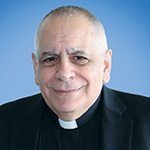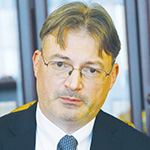
Msgr. Robert Vitillo, secretary general of the International Catholic Migration Commission, looks at monitors along with the director of the inpatient unit at St. Luke's Catholic Hospital in Ivano-Frankivsk, Ukraine. The monitors were among the medical supplies shipped to Ukraine earlier this year by Hospital Sisters Mission Outreach.

As with every container of medical supplies and equipment collected for donation by Hospital Sisters Mission Outreach, when the 40-foot container of supplies bound for Ukraine was ready to leave the shipping dock in Springfield, Illinois, in April, people gathered around it.
"Everyone who's in the building, our volunteers, our staff, even the truck driver gathers in a circle and says our container prayer," Erica Smith, president and executive director of the nonprofit, said during a webinar hosted by CHA on Oct. 26. The prayer, she said, is "for everyone who's worked on this container, who's going to help transport it, and most importantly for the people who are going to use the materials."

The webinar connected Smith, who joined from Springfield, with people in Ukraine who have seen how the container's contents have been welcomed and put to use as part of the Catholic humanitarian relief effort. The effort began just after Russia invaded Ukraine in early 2022. During the webinar, "Live From Ukraine: Catholic Partnerships in Ukraine: Reflections and Future Challenges in Healthcare and Mental Health Support," Msgr. Robert Vitillo, secretary general of the International Catholic Migration Commission; Christian Kostko, a consultant for the Catholic Response for Ukraine Working Group; Dr. Ivan Budzan, a surgeon; and Maria Trakalo, a psychologist and psychotherapist, shared their perspectives from Ukraine. Bruce Compton, senior director of global health for CHA, moderated the discussion.

Mapping the journey
Kostko said he was visiting the projects already funded by the International Catholic Migration Commission, which is the convener of the working group that is coordinating the relief effort among Catholic groups.
He also was reviewing projects submitted for funding in the next cycle.

Kostko, Msgr. Vitillo and others started their journey in mid-October in Poland and drove to Lviv, Ukraine, where the relief effort includes supporting mental health centers providing care to those traumatized by the war. From there they traveled south to Odesa, the scene of several recent bombings.
"We continued our meetings with very brave and dedicated priests and laypeople who were working with children and adults in these areas, helping them to overcome the psychological and emotional difficulties of war," Kostko said.
One of their visits was with Budzan, a cardiac surgeon who is working in a hospital serving the military. The hospital got some equipment through the shipment coordinated by Hospital Sisters Mission Outreach.
"I want to say thank you from all of my colleagues, from all doctors, for your support," Budzan said. "It's appreciated and it's making us much more strong."
Impact and needs
Msgr. Vitillo said the impact of relief efforts has been especially felt among rural hospitals because those facilities are caring for severely injured members of the military who are returning home.
"Every single place we went to also alerted us that they need much more, and they are grateful that they could identify the kinds of things that they need," Msgr. Vitillo said. "And so we're hoping that there will be a future container."
Msgr. Vitillo met with clergy, psychologists and students who expressed the need for continued funding for mental health treatment. He visited a center where children, many with autism, made pottery, and he visited residences for displaced elderly people, where many shared recipes with one another and even staged cooking contests.
"This is all very, very important work that's going on in every place," he said. "When we were there, the request was 'Please continue to support us.'"
Trakalo said more than 70% of Ukrainians lack access to a psychologist or psychotherapist. Teenagers are particularly vulnerable, she said, because they understand a lot about the situation but can't make their own decisions or protect their families.
"Kids have more resilience than adults, but they use energy from adults in their family," she said. "So if we are talking about military families, where parents are separated, that there is a soldier now, so many kids have no possibility of self-resilience because they haven't two parents at home."
Responsible relief
Smith explained that the relief effort isn't as simple as gathering supplies from anyone eager to donate. When the war in Ukraine broke out, she said aid groups were overwhelmed with offers to provide medical supplies
and equipment. "Particularity in times of crisis, as hard as it is and as much of a need as it is, we really (need to) make sure our donation and the process is done responsibly," she said.
She said Hospital Sisters Mission Outreach first looks at logistics: Can the recipient handle getting a 40-foot container of medical supplies and equipment? Can they transport it? Can they store it and distribute things from it safely? And have people requested what is inside it?
The shipment of supplies that left the United States in April included necessary paperwork and packing lists. Knights of Columbus in Poland acted as a consignee to get the container from the port when it arrived in June. The container was filled with about $300,000 worth of goods, including a EKG/ECG unit and trauma, surgical and general medical supplies.
"When you do these things correctly, you prevent costs and delays in shipping," Smith said. "It's especially important when you're working with partners who are in an acute crisis, whether that's the aftermath of a hurricane or a natural disaster or war or conflict."
If things are incorrectly shipped or if there are items that nobody said they needed, the supplies can get stuck on ports and tarmacs and clog the transport lines, she said.
"There has been a really strong sense of connection with Ukraine," Smith said. "And that can't allow us to deviate from our standard practices, and it's important everywhere that we strive to have this level of respect and quality."
A papal perspective
Over the last 20 months, Msgr. Vitillo said, the International Catholic Migration Commission has gathered more than $400,000 in support. He pointed out that donations can be made at icmc.net/supportukraine.
Msgr. Vitillo said Pope Francis is aware of the coordinated relief effort of Catholic Response for Ukraine, which is a new model for humanitarian response. He said the pontiff has endorsed the model.
Msgr. Vitillo ended the webinar with a recent reflection from Pope Francis that evokes the story of the Good Samaritan. It says in part: "Let us ask the Lord for the grace to draw close to all migrants and refugees who knock at our door, because today anyone who is neither a robber nor a passerby is either injured himself or bearing an injured person on his shoulders."
